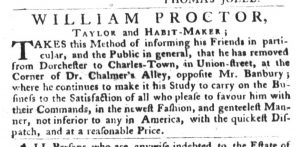What was advertised in a colonial American newspaper 250 years ago today?

“He has removed from Dorchester to Charles-Town.”
William Proctor, a tailor, placed an advertisement in the South-Carolina Gazette and Country Journal when he relocated from the small town of Dorchester on the Ashley River to the bustling urban port of Charleston. He addressed his notice to both “his Friends in particular, and the Public in general,” a strategy intended to maintain any clients who wished to patronize him at his new location as well as introduce him to the residents of Charleston.
Given that Dorchester, a town already in decline and abandoned after the American Revolution, was eighteen miles from Charleston, Proctor probably had few existing customers in his new city. After all, residents could choose from among many tailors and others who worked in the garments trades in one of the largest ports in the American colonies. Still, acknowledging “his Friends in particular” in his advertisement served an important purpose. It signaled to prospective clients that he had experience pursuing his trade, that he had previously cultivated a clientele in Dorchester and thus deserved their consideration now that he set up shop in Charleston.
He enhanced that appeal by underscoring that “he continues to make it his Study to carry on the Business to the Satisfaction of all who please to favour him with their Commands.” Proctor provided his own testimonial about the quality of the garments he made and the level of customer satisfaction he previously achieved, promising that new clients would not be disappointed if they engaged his services. In case some prospective customers remained skeptical about the clothing he produced, the tailor proclaimed that he constructed garments “in the newest Fashion, and genteelest Manner, not inferior to any in America.” In so doing, he cautioned readers not to dismiss him as a backwoods amateur merely because he had lived and worked outside the colony’s largest city. Instead, he pledged that he was as familiar with current trends – and capable of replicating them – as tailors from Charleston as well as Philadelphia and New York. That he made such a claim at all suggested that he was prepared for prospective clients to assess his efforts and reach their own conclusions, realizing that word of his ineptitude would spread if he did not manage to achieve “the Satisfaction of all who please to favour him with their Commands.” Proctor’s advertisement established a narrative about his skills and the types of garments he created, but consumers possessed the power to verify or discredit the reputation he attempted to construct.
